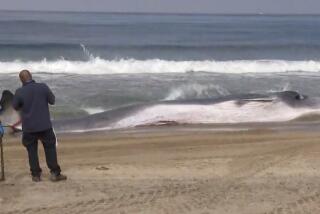Thar she blows! -- up, that is
- Share via
Florence, Ore. — Probably the only reason to visit Florence is to retire, see a friend or hear more about the exploding whale.
I am not in the mood for retirement at the moment, but the almost legendary story of the exploding whale was intriguing. It was told to me by ex-journalist Gayle Montgomery, whom I knew at the Oakland Tribune, where weirdness has always had an eager audience.
Montgomery moved here a few months ago and e-mailed me immediately when he heard about the historic moment in Florence history. He also sent me a book about the incident, titled, predictably, “The Exploding Whale.”
It was written by television reporter Paul Linnman, who covered the story and who wrote the book to prove that there truly was such an unlikely occurrence. Some of those spattered by blubber and whale guts can no doubt still recall the smell.
Florence is otherwise a nice little coastal town of little consequence. With a population of about 7,000, it dozes peacefully along Highway 101, roughly 50 miles west of Eugene, which also is a town of little consequence, although larger.
Like much of the state, Florence possesses the kind of ocean vistas that attract thousands of humans each year. Whales also have a hankering for Florence, for reasons of their own, and are often seen frolicking off the coast, having a good time mating and blowing water into the air. And sometimes, possibly seeking a nice place for their final days, they beach themselves on a sandy shore and die.
That’s what happened to an 8-ton gray whale on an otherwise pleasant morning in November 1970. Florence awoke to the news that a 45-foot-long behemoth was sprawled on a beach just south of town. A crowd gathered to look, because many had never seen a beached whale before. In Malibu, they’d have danced around it, praying and chanting, but in Florence they just stared.
Dead things, as everyone knows, send up an odor the likes of which one cannot imagine unless one has actually caught a whiff of a dearly departed relative left to rot. No one quite knew what to do with a decaying whale, and eventually the essence of its putrefying remains began to fill the otherwise clean air of Florence. Something had to be done. The state of Oregon was summoned to the rescue. That was a mistake.
There is no better way to make a bad thing worse than to call out a government agency. Men of the state Highway Division arrived. They looked at the whale. They smelled the whale. They shook their heads. And then they consulted with the Navy.
So now we’ve got the government and the military involved, which is prelude to disaster. Wars are begun and whole nations laid waste by just such a combination of bureaucracy and bombs. In his book, Linnman writes:
“[A] worker on the small bulldozer was now making his way to near where I was standing. His front loader was filled with cardboard boxes, and as he drew closer, I could make out the words ‘Dangerous’ and ‘high explosives.’ ... I also saw a man walking in my direction wearing dark coveralls and carrying a little box with a plunger and wires coming out of the top -- a detonator, just like the ones used by cartoon characters Wile E. Coyote and Daffy Duck.”
You can guess the rest.
After deciding not to bury the whale carcass because it might be dug up by dogs or souvenir hunters, the state agents in charge, influenced by the Navy, decided to do what the military does best: Blow it up.
The theory was that a half-ton of dynamite would blow the dead mammal into such small pieces that it would fall like confetti over a wide expanse and no one would notice.
Wrong.
“Explosions in the movies usually look like a blast of fire and smoke,” Linnman writes. “This one more resembled a mighty burst of tomato juice.”
I’m trying to picture the blood, guts and blubber that came raining down on the beach and beyond, and although Linnman paints a fine word-picture of the incident, it is beyond me. There was gore everywhere, including a large chunk that smashed in the roof of an
almost-new Oldsmobile.
“We were,” Linnman notes, “in a massive blubber shower.”
That it was an event worth remembering is not necessarily so in Florence. The locals who were around at the time regard me with a shrug when I ask about it or pretend never to have heard of the incident. A skeptic chose to believe that it was urban legend and had never actually happened. Would the government of Oregon and the United States Navy be so stupid as to blow up a dead whale and spatter it throughout a clean and peaceful little town?
Yup.
I’m not sure what they’ll do to my old pal Montgomery, having been instrumental in reminding everyone of the event. It’s what they get for allowing a journalist, retired or otherwise, into town. I just hope they don’t ask the government and the Navy for advice in punishing him.
I’m not waiting around to see. I’m outta here.
(To be continued)
More to Read
Sign up for The Wild
We’ll help you find the best places to hike, bike and run, as well as the perfect silent spots for meditation and yoga.
You may occasionally receive promotional content from the Los Angeles Times.






